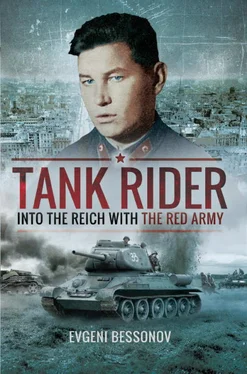After I came back to the battalion, I was sent with my company to Friedrichagen to guard the former German centre for development of V missiles. At that time we did not know what kind of centre it was. We only knew that our experts were working there, some of them were Colonels and were holders of Stalin’s Award (they had those small Stalin Award badges). We stayed there for three or four months, and then, in late November I think, we came back to our base.
In October 1946 they introduced wages depending on the military rank and office. Because of this my wage grew from 1200 roubles to 1500 or even 1700 roubles, I do not remember exactly. Besides that, we were issued German marks. However, one could not buy anything with them, and there was actually nothing to buy. One could go to a barber’s shop – they had already opened again. One could pay with just cigarettes.
By 1947 there were only three veterans left in the battalion – commander T. G. Kozienko, his deputy, Gerstein, and me. By that time the battalion consisted of just eight officers and five soldiers. We prepared guns for long-term storage and helped the tank crews to prepare tanks for long-term storage. We did not do anything else, except for going on guard duty in the city, as there were almost no soldiers left in our Brigade.
In late December 1947 I went to the USSR, to Tbilisi. This was the end of my service in the 1st motor rifle company, 1st motor rifle battalion, 35th Guards Mechanized Kamenets-Podolsk Brigade.
BROTHERS IN ARMS

The Company
The company commander’s staff consisted of the company commander himself, the company’s Sergeant Major, the clerk, the medic, the orderly and the runners from the platoons. It is impossible to remember all the names of all soldiers, and there is no point in listing all the names. However, I will provide several names.
Vasily Blokhin, the company’s Sergeant Major. He was older than me. He had been in the war for a long time, even taking part in the battle of Stalingrad. He was strong and tough, a former seaman of the Pacific Fleet. We became good friends. In March 1944, in the town of Skalat he was heavily wounded. After Blokhin Mikhail Karpovich Bratchenko, born in 1916, was appointed the company’s Sergeant Major in September 1943. He was a veteran; in Kursk he was a machine-gun crew leader in the machine-gun company. A tall and strong person, he was a brave and demanding NCO, but also caring for his subordinates. He was with the company in action all the time. He treated me as a friend, but did not allow for any familiar manners. He was in the company from 1943 till the end of war. I met him in Moscow in 1995.
Barakovski, the company’s clerk. A big guy, but not strong physically. He suffered from night-blindness – could not see anything in the evening. Took good care of his responsibilities. Soldiers often asked him for help. As a rule, he was with the company. I think that he went missing in action in January 1945 – I cannot remember where and how he disappeared.
Safronov, medic . He was approximately 45 years old, the company’s veteran. He was a big and physically strong person. He took care of us well. He was kind-hearted and soft, a good comrade, he sometimes called us younger officers by our first names ‘Zhenya’, ‘Pete’. It was only the company commander that he addressed with full title. He was killed in August 1944 at the Sandomir bridgehead by a shell from our Russian tank.
Jambul, sniper. A strong and muscular man. He was a Kazakh. He was expert in handling his rifle. Went missing in action in March 1944. He was very quiet as he did not speak good Russian.
Sabaev, assistant platoon leader. I took part in battles at Kursk together with him. He was of medium height, some five years older than I was. He was a cunning guy. After those battles he was appointed Sergeant Major of the 2nd company. I rarely saw him after that. He survived the war – I met him by accident after the war in Germany (in May 1945), when I was on my way back from hospital.
Andrey Ulianovich Drozd, my orderly from January 1945. Born 1925. In general, he was supposed to be called runner, but I would call him orderly. A tall guy, of the same height as me, he was fast, brave and always an optimistic person. He was very enduring, a wiry kind of guy. He saved my life during an assault, when he cut down a Fritz that had been aiming his rifle at me. He is still alive, living in Korosten (Ukraine). Worked as a driver after the war. Now retired.
Nikolai Ilyich Chulkin, clerk. Born in 1925. He arrived in the battalion in October 1943. He was of average height, not very strong physically, but enduring and brave. He was very modest. He would often go on reconnaissance missions with the squad, and many times was in hard situations, but managed to get out from them due to his bravery and cleverness. He had good handwriting and was appointed the company’s and then battalion’s clerk for his diligence, eagerness for work, as well as modesty and literacy. He served in the personnel section of the Brigade for a long time after the war (Bernau, Eastern Germany). He was awarded several times during the war. He worked as an operator of harvesting machine and was awarded with Order of Lenin already in peace time. He lives in Vinnitsa area (Ukraine).
Nikolai Mikhailovich Savkin, Sergeant. Born in 1925. He arrived at the battalion in October 1943 with a replacement of almost untrained soldiers. He quickly won a good reputation. In almost every operation he was acting platoon leader, replacing wounded Lieutenant Petr Shakulo. Savkin was tall, quick and enduring. He was extremely brave. Always followed order. I liked him a lot. He went missing in action in January 1945 together with his squad and a tank that had broken down and had to stop for repairs. They later said that retreating German units that ended up in our rear, attacked the village where the tank had to stop. After a short battle Germans burnt the broken tank, destroyed the crew and executed the squad from main guns of their tanks. This is how Sergeant Nikolai Mikhailovich Savkin died, being 19 years old.
‘Brotherly Heart’, medic. He arrived after Safronov’s death. He appeared in the company in October 1944. For some reason I only remember this nickname, not his last name or even his first name. He knew his job well, bandaging soldiers on the battlefield, sending wounded to the hospitals and burying the dead. He was quite old already, he was around 40 years old. He was a real fan of card games and made many officers addict to cards, but never cheated during card games. He was tall and slim, physically strong. When we were stationed on Sandomir bridgehead (autumn 1944), he was quite good at making moonshine. In April 1945 he was wounded in his back, when he was standing behind me on a tank and all splinters hit him, not me. I left a soldier together with him to send him to a hospital. I have not heard anything about him since that time.
Karabai Tajidaev, Sergeant. Born in 1925, a heavy machine-gun (Maxim) leader from the company’s MG platoon. A Kazakh, he fought the war from 1943 to 1945. He survived the war. He was a great guy. He was of medium height, enduring and brave person. He arrived in the company in October 1943. At first he did not speak good Russian, but later learnt the language very well. I was always relying on the fire support of his Maxim machine-gun. He distinguished himself among other soldiers of his age with his outstanding bravery. Both the battalion and the company loved him, he was awarded with several decorations. He left the Brigade in 1947 (from Bernau, Germany).
Читать дальше














